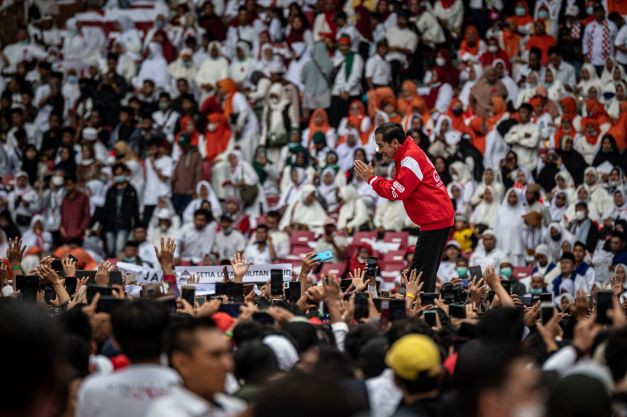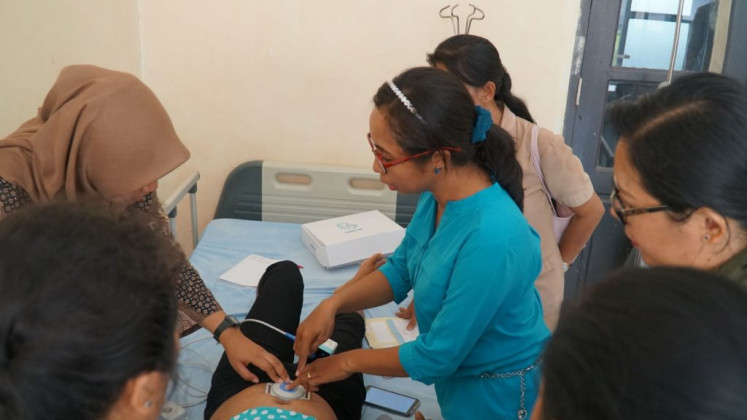Popular Reads
Top Results
Can't find what you're looking for?
View all search resultsPopular Reads
Top Results
Can't find what you're looking for?
View all search resultsFloating mass, not political parties, will decide 2024 elections
Most opinion surveys still put the PDI-P ahead of other political parties in the elections, but the recent open feud between Megawati and Jokowi could change all that.
Change text size
Gift Premium Articles
to Anyone

Political parties may call most of the shots in next year’s elections. They have the power to nominate the presidential and vice-presidential candidates, as well as the candidates for the national and local legislatures.
But they may be missing out on what is widely known in Indonesian politics as the “floating mass”, people who are not members of any political party, who feel no obligation to vote for any of them, and who will switch their votes from one election to the next.
Incumbent President Joko “Jokowi” Widodo understands the concept of the floating mass much more than any other politician in the country. This explains a lot about how he, as an outsider to the political establishment, won the presidential election in 2014 and again in 2019. He does not chair a political party, but he has been able to capture the people’s aspirations, where other politicians and political parties failed, or ignored them.
Although Jokowi is not running in 2024, he has remained powerful, not a lame duck president who has just over a year more in office. Millions who voted for him in the last two elections have remained loyal to him and will vote in accordance with his directives. Since they are not as well organized as political parties, their exact number is not known.
But it would be wrong to dismiss or ignore the power of the floating mass in deciding the results of both the presidential and legislative elections on Feb. 14 next year.
These volunteers, called “Jokowers”, were instrumental not only in sending Jokowi to the Presidential Palace twice, but also in helping the Indonesian Democratic Party of Struggle (PDI-P) win the legislative elections both in 2014 and 2019. It would be no exaggeration to suggest that Jokowi, and his army of volunteers, helped reverse the party’s fortunes at the polls, which had declined in the two previous elections.

PDI-P chairwoman Megawati Soekarnoputri has insisted, somewhat disparagingly, in calling Jokowi “a party officer” who must succumb to the wishes of the party, and hence its chair. In recent speeches she claimed that Jokowi would not have been president had it not been for the party that gave him his presidential tickets.
She may be right in claiming some credit for making Jokowi president, but she may see her party’s share of the vote decline again next year, unless she also publicly recognizes his contribution to the party’s performance in 2014 and 2019, and tries to win the hearts and minds of the floating mass, many of whom remain loyal to Jokowi.
Most opinion surveys still put the PDI-P ahead of other political parties in the elections, but the recent open feud between Megawati and Jokowi could change all that.
Their interests have further diverged as the election nears. Megawati wants to make sure that the party wins the legislative elections and that its candidate Ganjar Pranowo clinches the presidency. Jokowi’s wants to make sure his successor protects and continues his legacy, but he has also been building a new family dynasty of his own, getting his children and in-laws into politics.
Jokowi has not yet endorsed Ganjar and is even entertaining the idea of throwing his support behind Defense Minister Prabowo Subianto, founder and chair of the Gerindra Party.
The floating mass is an anomaly in Indonesian politics, a legacy of the regime of then president Soeharto who ruled for over three decades by depoliticizing the masses, who were only deployed around the six elections his regime held during his rule from 1965-1998.
He used Golkar, short for Golongan Karya or functional groups representing people from all walks of life, to achieve this. Although Golkar did not see itself as a political party it served like one to support his rule. As part of the floating mass concept, the regime promoted de-parpol-isasi, discouraging people from joining political parties, even after their number had been limited to two.
Backed by the military, Golkar won all six elections with an overwhelming majority. The two parties, the Islamist United Development Party (PPP) and nationalist Indonesian Democratic Party (PDI) stood little chance, and became tools to give the elections a semblance of democracy.
In the post-Soeharto multi-party electoral system, Golkar has contested the elections as a political party without the benefit of the floating mass. It still came in the top-two positions in the five elections held since 1999.
The floating mass has far more options in a more democratic setting. It has remained outside the political party system, but thanks to social media, it understands politics far more than the floating mass of the Soeharto era, which was politically ignorant, and vulnerable to manipulation, intimidation or coercion.
Susilo Bambang Yudhoyono was the first to reap the benefit of the floating mass, winning the presidential election in 2004 riding on the new small Democratic Party. In 2009, he won a landslide victory and his party became the winner in the legislative elections. The Democrats have performed poorly since he stepped down in 2014, dropping to sixth place in 2019. The floating mass abandoned them just as quickly as it had supported him.
Jokowi became the second beneficiary of the floating mass. He has used social media platforms effectively, directly staying in touch with his loyal supporters. He has no real need for political parties. His social media pages boast millions of followers.
The presence of the floating mass, and its ability to impact election results is a reflection of the failure of political parties to truly represent the people. Their failure gave the likes of Yudhoyono and Jokowi the opportunity to capture the people’s aspirations and win elections in which the political parties played a supporting rather than a leading role.
In the past year, Jokowi’s volunteers have organized several gatherings, including what they called a “people’s congress”. All of them were well-attended, sending the message about the power and influence Jokowi has over the floating mass.
Last week, in a meeting with volunteers calling themselves “Red-and-White Solidarity”, Jokowi told his volunteers not to rush into making their decisions about which political party or presidential candidate to choose in February. He is clearly biding his time. He said: “Start the engine now. Let’s fortify the volunteers’ organization while remaining patient.”
***
The writer is senior editor of The Jakarta Post.










